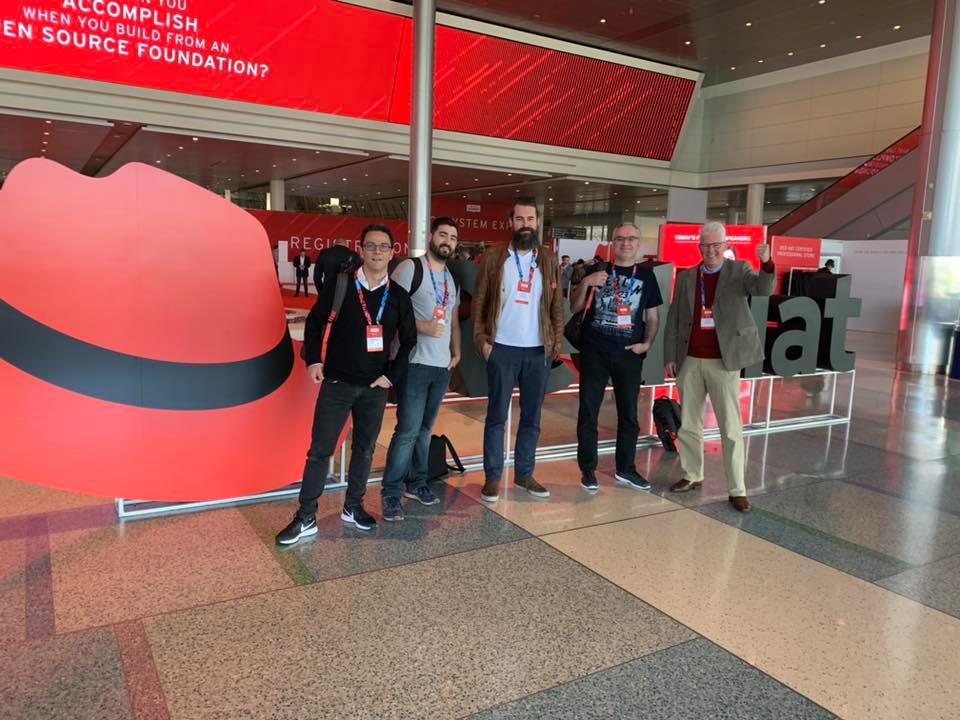8.900 attendees gathered for an exciting 3 days with some big announcements and plenty of experience and knowledge sharing through the numerous sessions, labs, birds of a feather sessions, panels, … Kevin Tibi, Phillippe Entringer, Pascal Tournillon (DTC France), Filip Lenaerts (Devoteam Belgium) and Geert Stragier (Group Offer Dir. Cloud & Devops) joined the exciting Red Hat Summit that took place from 6 – 9 May in Boston!
It was a rich conference, from which we came away with the strong conviction that DevOps and Enterprise Container Platforms are now rapidly becoming mainstream in all big enterprises. Compared to last year’s conference where still many were experimenting with first Proof of Concepts, this year was full of customer stories and experiences of mature and larger scale deployments.
Takeaway #1 – Red Hat’s Kubernetes enterprise Platform Openshift is leading in the industry to provide the Enterprise ready platform to support this.
As Pascal Tournillon puts it:
“OpenShift, OpenShift, OpenShift… it is everywhere, it’s all about OpenShift! So many talks, so many announcements, so many customer feedbacks around OpenShift: it’s clearly the subject that, to me, was the most highlighted.
During the Summit, Red Hat Openshift 4 was released for general availability with important new functionalities:
- More advanced self-service provisioning automation, including for the Openshift platform itself (a pain point in the past)
- Red Hat Code Ready Workspaces to enable developers to leverage containers and Kubernetes, while working with familiar integrated development environment (IDE) tools
- Key new capability with OpenShift Service Mesh, which is based on the Istio open source project and provides a single capability that encodes communication logic for microservices-based application architectures.
- Operator-enabled application environments (“Software Operators”) on OpenShift with Red Hat Middleware. This enables IT organizations to unify their development environments around Operator capabilities. This lets programmers focus on delivering and applications without worrying about updating or maintaining of tooling.
TakeAway #2 – The enterprise scale up of the Cloud and Container platforms are key to enable the Enterprise wide DevOps and Digital Transformation.
However necessary a sound technology foundation is, it is by far not sufficient to address the need for speed & agility that is crucial for Digital success. People, Process, Culture are crucial to successfully realise the through change in the enterprises.
As Pascal Tournillon comments, through several session [he] noticed that we still have a lot of work to be done with our customers to help them on their transformation journey, and that’s good news! We were already convinced of that, but this summit clearly gave us customers and IT professionals feedback around that subject.
Globally transformations have been initiated everywhere, but many customers struggle in the middle of their journey. Customers have invested in new technologies, but a lot of them have largely underestimated the people / process’ side of the transformation.
Take away #3 – The importance of Red Hat as key vendor for container based hybrid cloud platform of tomorrow was strongly underlined by 2 of the world’s leading CEO’s – Gini Rometty, CEO of IBM and Satuya Nadella, CEO of Microsoft – joining Jim Whitehurst, CEO of Red Hat, on stage during his keynote address.
IBM’s Gini Rometty strongly endorsed the importance of Red Hat to IBM and clearly addressed the questions that many might have around its 34B$ acquisition of Red Hat.
-
- She endorsed the key concepts of Open Source (“if you get (the benefits) you should provide”) and emphasised that IBM has a strong open source history from the very beginning.
- She praised Red Hat’s company culture. Some Quotes: “Red Hat has built a wonderful Company Culture”, “(this company culture) should change IBM”
- She confirmed the independence of Red Hat as a company – “Red Hat should stay an independent company, they have to continue to invite everyone to contribute to the innovation”
- Kubernetes will be the standard container platform going forward, with a central role for Openshift as platform of the future.
- We are now moving into Scaling of innovation, many clients are at that stage of moving from pilots to scale, IBM’s deep enterprise knowledge and connections will be a key enabler into this scaling.
Microsoft’s Satia Nadella announced Red Hat Openshift as a jointly managed service on the Azure public cloud.
-
- The RedHat & Microsoft collaboration is globally extended. One of the consequences is the reinforcement of OpenShift services on Azure.
- The new Azure RedHat Openshift can be now a fully managed platform (No more interactions with the underlying VMs or IaaS for customers) with enhanced and easier access to Azure services that will be more transparently usable through the platform.
- In addition Microsoft and Red Hat collaboration gives birth to new offers like SQL Server 2019 on RHEL8 and globally enhanced support of RHEL8 & Ansible on Azure.
